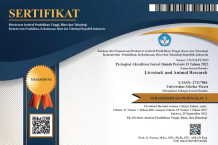Tannins, flavonoids, and lignin levels of clitoria ternatea L legumes in different levels of urea fertilizer and harvesting age
Abstract
Objective: Clitoria ternatea L is a legume that has the potential as animal feed. This study determined to evaluate tannins, flavonoids, and lignin levels in different urea fertilizer applications and harvesting ages.
Methods: This study used a split-plot design with three replications. The main plots were urea levels (0 kg/ha, 100 kg/ha, and 200 kg/ha), as subplots were harvesting ages (30, 45, and 60 days after planting (DAP)). Fresh weights of Clitoria ternatea L harvested at the ages of 30, 45 and 60 DAP were weighed and recorded. The weighed forage is put in newspapers and dried in a 55°C oven for three days to gain a constant dry weight. The dried samples were then ground using a willey mill with a sieve porosity of 1 mm. Furthermore, the sample is analyzed to determine the content of secondary metabolites. The parameters observed were tannins, flavonoids, and lignin levels. Analysis of variance (ANOVA) was used to analyze Research data, and Duncan's Multiple Range (DMRT) was used to analyze the differences between means.
Results: The lowest lignin content of Clitoria ternatea L was prodiced in non-urea treatment (20.64± 2.53%), and significantly different compared to various levels of urea fertilization treatment (P<0.05). The highest tannin levels were obtained at 30 DAP harvest age (4.20±0.56%) and significantly different (P<0.05) from tannin levels at 45 and 60 DAP. The lowest flavonoid levels were obtained when the plants were harvested in 60 DAP (0.87±0.05%) and significantly different (P<0.05) compared to 30 and 45 DAP.
Conclusions: The increase of urea fertilization level in Clitoria ternatea L only significantly affected lignin levels. The decrease of lignin content value is linear with the increase of harvesting age. In contrary, harvesting age of Clitoria ternatea L showed significant linear effects on tannins and flavonoids value.
Keywords
Full Text:
PDFReferences
- Purba, E. C. 2020. Kembang telang (Clitoria ternatea L): pemanfaatan dan bioaktivitas. Jurnal Pendidikan Matematika dan Sains. 4(2):111-124.
- Astati and Kasmawati. 2017. Effect of okra flour on body weight of diabetic wistar rats. Jurnal Sains and Teknologi Pangan. 2(1): 335-341.
- Mierziak, J., K. Kostyn, and A. Kulma. 2014. Flavonoids as important molecules of plant interactions with the environment. Molecules. 19(10):16240-16265. Doi: 10.3390/molecules191016240
- Panche, A. N., A. D. Diwan, and S. R. Chandra. 2016. Flavonoids: an overview. J. of Nutr. Sci. 5(47). Doi: doi.org/10.1017/jns.2016.41
- Verma, N. and S. Shukla. 2015. Impact of various factors responsible for fluctuation in plant secondary metabolites. J. Appl. Res. Med. Aromat. Plants. 2(4):105-113. Doi: 10.1016/j.jarmap.2015.09.002
- Verma, N. and S. Shukla. 2015. Impact of various factors responsible for fluctuation in plant secondary metabolites. J. Appl. Res. Med. Aromat. Plants. 2(4):105-113. Doi: 10.1016/j.jarmap.2015.09.002
- Meteorological, Climatological, and Geo physical Agency. 2021. Badan Meteorologi, Klimatologi, dan Geofisika Wilayah Yogyakarta.
- Chanwitheesuk, A., A. Teerawutgulrag, and N. Rakariyatham. 2004. Screening of antioxidant activity and antioxidant compounds of some edible plants of Thailand. Food Chem. 92:491-497. Doi: 10.1016/j.foodchem.2004.07.035
- Datta, A., A. Betterman, and T. K. Kirk. 1981. Identify specific manganese peroxidase among ligninolytic enzymes secreted by Phanerochaete chrysosporium during wood decay. Appl. Environ. Microbiol. (57): 1453-1460. Doi: 10.1128%2Faem.57.5.1453-1460.1991
- Astuti, M. 1980. Experimental design and statistical analysis. Livestock Breeding Section. Faculty of Animal Husbandry. Gadjah Mada University. Yogyakarta.
- Kumar, R.T., S. R. Kumar, and V. S. Anju. 2017. Phytochemical and antibacterial activities of crude leaf and root extracts of Clitoria ternatea varieties (Fabaceae). J. Pharmacogn. Phytochem. 6(6): 1104-1108.
- Sutedi, E. 2013. Potency of clitoria ternatea as forage for livestock. Wartazoa. 23(2): 51-62. Doi: 10.14334/wartazoa.v23i2.715
- Rachmansyah, A., Sumarsono, and E. D. Purbajanti. 2014. Quality and tannin content of forage koro sword (Canavalia ensiformis L.) in population manipulation and intercrop-ping patterns with sweet corn (Zea mays L. saccharata). Agromedia. 32(2): 31-37.
- Di Vittori, L., L. Mazzoni, M. Battino, and B. Mezzetti. 2018. Pre-harvest factors influencing the quality of berries. Sci. Hortic. 233:310-322. Doi: 10.1016/j.scienta.2018.01.058
- Styawan, A. A. and G. Rohmanti. 2020. Determination of flavonoid levels by alcl3 method in methanol extract of telang flower (Clitoria ternatea L.). Jurnal Farmasi Sains dan Praktis. 6(2):134-141. Doi: 10.31603/pharmacy.v6i2.3912
- Setyorini, D. and S. S. Antarlina. 2022. Secondary metabolites in sorghum and its characteristics. Food Sci. Technol. 42. Doi: 10.1590/fst.49822
- Brakhage, A. A. 2013. Regulation of fungal secondary metabolism. Nature Reviews Microbiology. 11(1):21-32. Doi: 10.1038/nrmi cro2916
- Yulistian, D. P., E. P. Utomo, S. M. Ulfa, and E. Yusnawan. 2015. Studi pengaruh jenis pelarut terhadap hasil isolasi dan kadar senyawa fenolik dalam biji kacang tunggak (Vigna unguiculata (L.) Walp) sebagai anti-oksidan. Kimia Student Journal. 1(1):819-825.
- Hanafiah, O. A., D. S. Hanafiah, E. S. Bayu, S.Ilyas, M. Nainggolan, and E. Syamsudin. 2017. Quantity differences of secondary metabolites (saponins, tannins, and flavonoids) from Binahong plant extract (Anredera cordifolia (Ten.) Steenis) treated and untreated with colchicines that play a role in wound healing. World J. Dent. 8(4):296-299. Doi: 10.5005/jp-journals-10015-1453
- Rahmah, A. A. 2019. Perubahan kandungan zat gizi, hcn dan tanin selama proses pengolahan sari koro pedang putih (canavalia ensiformis. Tesis. Magister ilmu dan Teknologi Pangan. Fakultas Teknologi Pertanian. UGM.
- Sarwar Gilani, G., C. Wu Xiao, and K. Cockell. 2012. Impact of antinutritional factors in food proteins on the digestibility of protein and the bioavailability of amino acids and on protein quality. Br. J. Nutr. 108(2):315-332. Doi: 10.1017/S000711451200 2371
- Jayanegara, A. and E. Palupi. 2010. Condensed tannin effects on nitrogen digestion in ruminants: A meta-analysis from in vitro and in vivo studies. Med Pet. 33:176-181. Doi: 10.5398/medpet.20 10.33.3.176
- Cahyani, R. D., L. K. Nuswantara, and A. Subrata. 2012. Effect of protein protection of soybean flour with mangrove leaf tannins on the concentration of ammonia, undegraded protein, and total protein in vitro. Anim. Agric. J. 1(1):159-166.
- Purnamaningrum, A. and E. Nihayati. 2019. Effect of mulch application and nitrogen dose on growth and yield of iler plants (plectranthus scutellarioides (L.) R. Br.). Jurnal Produksi Tanaman. 7(12): 2186-2195. Doi: 10.21776/1289
- Adianti, R., E. Proklamasiningsih, and N. D. Sasongko. 2019. Growth and flavonoid content of red spinach (Alternanthera amoena Voss) on growing media with humic acid and urea. BioEksakta: Jurnal Ilmiah Biologi Unsoed. 1(2): 91-95. Doi: 10.20884/1.BIOE.2019.1.2.1792
- Ma, D., D. Sun, Y. Li, C. Wang, Y. Xie, and T. Guo. 2015. Effect of nitrogen fertilization and irrigation on phenolic content, phenolic acid composition, and antioxidant activity of winter wheat grain. J. Sci. of Food and Agric. 95(5). Doi: 10.1002/jsfa.6790
- Grassi, D., G. Desideri., and C. Ferri. 2010. Flavonoids: antioxidants against atheroscle rosis. Nutr. 2:889-902. Doi: 10.3390/nu2080889
- Keraf, F. K., Y. Nulik, and M. L. Mullik. 2015. Effect of nitrogen fertilization and plant age on production and quality of kume grass (sorghum plumosum var. timorense). Jurnal Peternakan Indonesia. 17(2):123-130. Doi: 10.25077/jpi.17.2.123-130.2015
- Umami, N., Wardi, R. L. Nisa, B. Suhartanto, and N. Suseno. 2022. Butterfly pea (Clitoria ternatea) plants nutrient content and in vitro digestibility at different harvest ages at the second defoliation. in 6th international seminar of animal nutrition and feed science (ISANFS 2021). Atlantis Press. 6-10. Doi: 10. 2991/absr.k.220401.002
- Astuti, D., B. Suhartanto, B. Suwignyo, and M. Z. Asyiqin. 2019. Effect of harvest age and level of nitrogen fertilizer on production and nutrient content of Sorghum bicolor L. Nubu variety. Agrinova: J. Agric. Innov. 2(2):001-008. Doi: 10.22146/agrinova.54702
Refbacks
- There are currently no refbacks.










